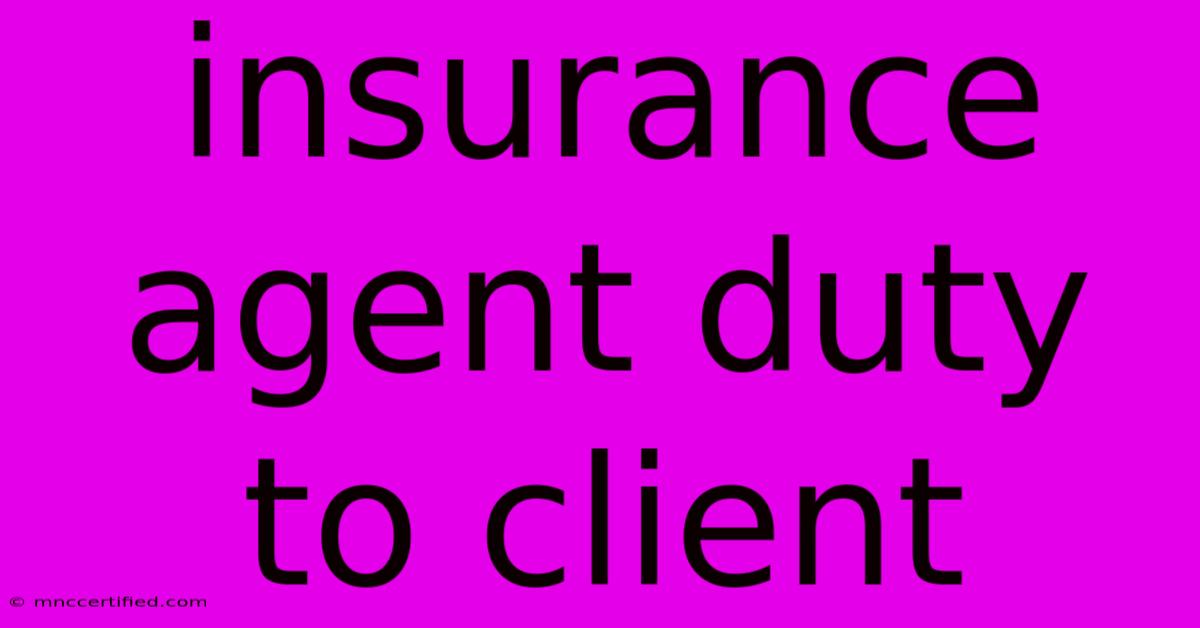Insurance Agent Duty To Client

Table of Contents
The Insurance Agent's Duty to Their Client: A Comprehensive Guide
Choosing the right insurance can be daunting. That's why you rely on an insurance agent – a professional who should act in your best interests. But what exactly is an insurance agent's duty to their client? This comprehensive guide explores the key responsibilities and ethical obligations agents owe their policyholders. Understanding these duties empowers you to choose an agent wisely and hold them accountable.
Understanding the Agent-Client Relationship
The relationship between an insurance agent and their client is fundamentally one of trust and fiduciary duty. This means the agent is legally and ethically bound to act in the client's best interests, prioritizing their needs above their own financial gain. This duty extends beyond simply selling a policy; it encompasses several crucial aspects.
Key Responsibilities of an Insurance Agent:
-
Suitability of Coverage: The most important duty is recommending insurance products that are suitable for the client's specific needs and risk profile. This requires a thorough understanding of the client's circumstances, including their assets, liabilities, and potential risks. An agent cannot simply sell the highest-commission policy; they must consider what policy best protects the client. This involves:
- Proper Needs Analysis: A detailed discussion to uncover the client's insurance requirements.
- Accurate Risk Assessment: Evaluating the client's exposure to various risks.
- Objective Recommendations: Presenting various options and explaining their pros and cons without bias.
-
Accurate Information and Disclosure: Agents have a duty to provide accurate, complete, and understandable information about the insurance products they offer. This includes clearly explaining policy terms, conditions, exclusions, and limitations. They must disclose any potential conflicts of interest. Hiding crucial information or misrepresenting policy details is a serious breach of duty.
-
Diligence and Care: Agents are expected to exercise reasonable diligence and care in handling their clients' insurance needs. This involves promptly responding to inquiries, processing applications efficiently, and providing ongoing support and advice.
-
Confidentiality: The information shared between an agent and their client is confidential. Agents are legally and ethically obligated to protect the privacy of their clients' personal and financial data.
-
Good Faith and Fair Dealing: The agent-client relationship is built on trust and good faith. Agents must act honestly and fairly in all their dealings with clients, avoiding any actions that could be considered deceptive or manipulative.
What to Do if Your Agent Breaches Their Duty
If you believe your insurance agent has breached their duty to you, you have several options:
-
Contact your agent: Attempt to resolve the issue directly with your agent. Clearly explain your concerns and request a resolution.
-
File a complaint: Many states have insurance departments that handle consumer complaints. File a formal complaint detailing the breach of duty.
-
Consult with a lawyer: If the matter is serious or cannot be resolved amicably, seek legal advice. A lawyer can help you understand your rights and pursue legal action if necessary.
-
Seek a new agent: If you've lost trust in your current agent, it’s acceptable to find a new one. Thoroughly research potential agents before making a change.
Choosing a Reliable Insurance Agent
Selecting a trustworthy insurance agent is crucial for protecting your interests. Consider the following factors:
-
Experience and Qualifications: Look for an agent with sufficient experience and appropriate qualifications.
-
Professional Designations: Designations like Chartered Life Underwriter (CLU) or Certified Financial Planner (CFP) can indicate a higher level of expertise.
-
Client Reviews and Testimonials: Research online reviews and testimonials to gauge the agent's reputation and client satisfaction.
-
Transparency and Communication: Choose an agent who communicates clearly and openly, answering your questions thoroughly.
By understanding the insurance agent's duty to their client, you can build a strong relationship based on trust and mutual respect, ensuring you receive the best possible insurance protection. Remember, your agent is working for you. Don't hesitate to ask questions and advocate for your needs.

Thank you for visiting our website wich cover about Insurance Agent Duty To Client. We hope the information provided has been useful to you. Feel free to contact us if you have any questions or need further assistance. See you next time and dont miss to bookmark.
Featured Posts
-
Barcelona 3 0 Bremen Ucl Highlights
Nov 27, 2024
-
Mexico May Impose Retaliatory Tariffs
Nov 27, 2024
-
Nick Preston Shelter Insurance
Nov 27, 2024
-
Commercial Insurance Santa Ana
Nov 27, 2024
-
2nd Odi Pakistans Dominant 10 Wicket Victory
Nov 27, 2024